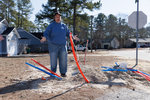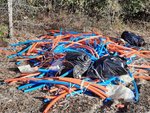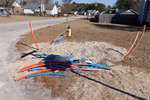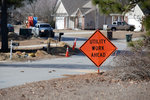



Charles Averitt said he looked out a window of his Hope Mills home last Thursday morning to see a line of vehicles parked outside.
“One dude had his stereo playing,” Averitt said. “I know that God could hear it up in heaven, it was so damn loud, because I could hear it in my bedroom. It was booming.”
Averitt said the workers were contractors for MetroNet, the Indiana-based company that is laying fiber optic internet, TV and phone lines throughout Fayetteville, Hope Mills, Linden, Wade, Stedman, Godwin, Eastover, Falcon, Spring Lake, Vander and much of unincorporated Cumberland County. MetroNet is also extending fiber-optic cable to Raeford and Rockfish.
The work started a year ago. When the $70 million project is finished in another year or so, it is expected to give the county a competitive advantage in attracting new businesses and jobs and much improved virtual-learning access and capabilities, a need the COVID-19 pandemic has uncovered all too well. The fiber-optic lines are expected to be faster and perhaps less expensive than the technologies currently available in the area.
But complaints about MetroNet contractors striking water and sewer lines, damaging private property and leaving behind mounds of trash are beginning to mount. A Facebook site called “Hope Mills Chatter” was awash with complaints last week after Averitt posted 22 pictures on it of the trash and debris that had been left behind in his Brightmoor neighborhood.
“They leave lots of tape that they use, drink bottles, cigarette packs, cigarette butts, bags,” Averitt said. “I try to keep my yard clean because that's just the way I like it. And with this stuff all over the place, it's just disgusting and disturbing that they don't have any more supervision to make sure that they're doing what they're supposed to do rather than leaving a mess.”
Averitt, who lives on Walkabout Road, posted his pictures Thursday. He said he tried contacting MetroNet that day but couldn’t get a response. He said he tried several more times before finally getting someone to respond on Monday.
“I just got off the phone with him and he said that he has spoken to the guys about keeping it clean but they don't seem to want to listen to him,” Averitt said. “But he said he would talk to him again and he would make sure that our street is cleaned up.”
At 5:30 p.m. Tuesday, the mess remained, and Averitt said he hadn’t heard back from the MetroNet representative after sending him pictures.
Keith Leonhardt, MetroNet’s vice president of communication and customer experience, said complaints from Averitt and others in Cumberland County “are not normal for us.”
“I can assure you that MetroNet is committed to doing all we can to make the construction of our fiber network as safe, orderly and uneventful as possible,” Leonhardt said in an email. “ We’re very aware that a poor construction experience could affect resident’s willingness to consider being our customer.”
Contractors are the problem, mayor says
Cumberland County will be the first in North Carolina to get MetroNet’s services. Elsewhere, especially in Indiana, complaints have followed the company’s contractors.
In Greenwood, Indiana, just south of Indianapolis, Mayor Mark Myers said the city twice had to “red tag” MetroNet, stopping all work until issues could be resolved. MetroNet started laying fiber-optic cable in Greenwood in 2017.
“The problem is it's not MetroNet themselves,” Myers said. “It's the subcontractors they hire out to do their boring and then the companies they're hiring to do the locates to find those gas lines, sewer lines, water lines, whatever else.
“But in one year alone, they bored through at least 22 gas lines. Lord knows how many sewer laterals they went through that we've had to have them go back and repair.”
Boring through sewer lines can cause sewage to back up into people’s homes. Boring through a gas line could result in an explosion and mass casualties, though Myers said that did not happen in his city.
Myers said Greenwood has experienced the same types of problems from other companies.
“It’s not just MetroNet, but they were by far the worst when they came in because they want to make a big presence quick,” he said. “They hired a lot of different subcontractors to come in and do their boring. Subs we're getting paid by the foot…so they need to lay the pipe and they do and then they hit a line because they're in too big of a hurry.”
Myers recalled an incident in which MetroNet contractors severed a gas line in a busy area of town at 4 p.m. on a Friday.
“We had to shut down that road for three and a half hours along with every business along the road,” Myers said. “That was a nightmare.”
Gas lines were being hit so often in Greenwood that the city temporarily stopped MetroNet from digging.
“A couple times when they hit the gas lines, we would just go out and red tag them and shut them down,” Myers said. “They finally, their vice president or head of construction safety, flew in to meet with me to try to put together a plan to make things better.
“When I see all these problems – and I used to be a firefighter so I have a higher sense of awareness of what's going on – my concern was very, very, very high for somebody getting hurt. Thank God nobody did.”
Leonhardt, the MetroNet spokesman, said in a statement that the company has “an unwavering commitment to safety.”
“MetroNet requires all construction contractors to follow strict guidelines for safe work,’’ the company’s statement said. “These guidelines are reviewed with all utility companies and city permitting groups prior to the start of our construction activity. Any contractor crew or team member that fails to follow our safety procedures is suspended, retrained, or dismissed.”
Myers said the other major complaints with MetroNet’s contractors came from residents.
“When they would come into their yard and set their boring machines, they would not come back and put the yard back to where it was prior to them working in it,” he said. “And we had to make numerous phone calls to them to get them to come back and fix people's yards.”
Problems in other cities
Greenwood wasn’t the only Indiana community to experience problems with the contractors.
Two cities just north of Indianapolis – Carmel and Fishers – in 2017 ordered MetroNet to stop digging after regulators found that the company was using unregistered contractors, according to Indiana Construction news and other published reports.
Contractors had hit 20 gas lines in the two cities. Fishers allowed MetroNet to continue digging five months later, after the company updated its safety practices and improved subcontractor training, a local TV station reported.
The Indiana Attorney General’s Office filed a lawsuit against five subcontracting companies that the Indiana Utility Regulatory Commission had found responsible for gas line damages. Two of the companies were fined, while others received warning letters or were ordered to conduct mandatory training.
Leonhardt said that during and after the Indiana problems surfaced, the company made comprehensive changes to its contractor safety standards, earned a safe digging award and had its vice president of safety appointed to the Indiana 811 board of directors. The board receives notifications of proposed excavation and notifies the public utilities responsible for locating and marking their underground lines.
“We now enjoy a very positive relationship with those communities and are serving thousands of happy customers there,” Leonhardt said.
Robert Van Geons, head of the Fayetteville Cumberland County Economic Development Corp., said his organization worked closely with MetroNet and community partners to bring the company to Fayetteville.
“It is unfortunate that there apparently have been a rash of issues recently, and we’ll be looking to MetroNet to make those right and to develop a plan to substantially reduce these occurrences,” Van Geons said in an email. “While we’d prefer there were zero incidents, if you research any major fiberoptic build out, by any major provider, you will find that issues with contractors hitting lines is not an uncommon occurrence. The community’s reception of their product will be defined by how they respond and the quality of their offering.”
Van Geons said he researched MetroNet before it came here and found that “while there were construction issues in a few of the communities, they ultimately delivered the product they promised.”
During early construction in Fayetteville, Van Geons said, he received positive feedback about the company’s work.
“We are looking to MetroNet to ensure that these recent issues are an outlier,” he said.
MetroNet and other utility companies have a legal right to access designated utility easements that are typically found within the strip of land running along the street, the sidewalk, the rear lot line or between two lots.
Fayetteville working closely with MetroNet
The Fayetteville Public Works Commission acknowledges that customers have reported MetroNet contractors striking their water and sewer lines.
Unlike water lines, a sanitary sewer line strike can take days before sewage backs up into a home, PWC spokeswoman Carolyn Justice-Hinson said in an email. The PWC is required to locate and mark its water and sewer lines before MetroNet contractors start digging, she said.
“If we are able to, we facilitate/help the customer work with MetroNet to resolve problems,” Justice-Hinson wrote. “MetroNet has been cooperative, has worked through issues to date and meets with PWC, the City and other organizations monthly for updates and discuss the project and work through any issues identified.”
Justice-Hinson said PWC also works closely with the Fayetteville Area Plumbing Contractor Association to assist customers when a sewer line breach is reported.
Association President Billy Cain said he asked six plumbing companies whether they had received many complaints about MetroNet contractors hitting sewer lines. Four of the six said they had, Cain said.
“One company did say it's been pretty common for them and it's mostly been over in the Buckhead subdivision off Raeford Road,” said Cain, who declined to identify any of the plumbers at their request.
Justice-Hinson said the PWC has budgeted $7.1 million in direct expenses to support the MetroNet project, including $1.5 million for underground utility location.
Greenwood mayor becomes MetroNet subscriber
While others complain about the MetroNet contractors, one resident seems to be taking it all in stride.
Mike Mitchell, who lives on Hope Mills Lake in the Clifton Forge subdivision, said a MetroNet contractor struck his sewer pipe, causing sewage to back up from a shower into a bathroom and the finished basement. Mitchell said he was told the damage, which included tiles that buckled in the basement, was caused because a PWC worker miss-marked the sewer pipe.
“When I checked with the MetroNet representatives, they immediately responded and sent a crew out,” Mitchell said. “And then they sent an environmental cleanup crew to our house.”
He said the damage was quickly repaired.
“I found them to be very responsive and quick to act,” Mitchell said. “There's a lot of animosity about the digging, but I, myself, I'm kind of happy to see the competition coming. Cablevision just can't compete with fiber optics.”
Myers, the Greenwood, Indiana, mayor, reluctantly acknowledged that he has become a MetroNet customer.
“Yeah, sadly I have to admit they're my provider,” he said, laughing. “Their services are good and their speed is good and their prices are better than most, so I switched. Yeah. It was hard, but I did.”
Greg Barnes is an investigative reporter for CityView TODAY. He can be reached at gregbarnes401@gmail.com. Have a news tip? Email news@CityViewTODAY.com.